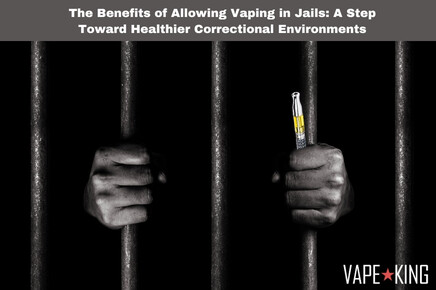The Role of Vaping in Transforming Prison Environments

Vaping has been introduced in prisons across various countries as a harm reduction method to help inmates quit traditional cigarettes. One notable example is the UK, where vaping products are available in prison tuck shops, and programs promote vaping as a healthier alternative. This initiative is part of broader smoking cessation efforts, and reports have shown that introducing vaping into prisons has improved overall atmospheres and significantly reduced inmate violence.
In 2017, the Isle of Man launched a six-month pilot program allowing inmates to use e-cigarettes instead of smoking illicit materials, such as tea bags and banana peels, following a smoking ban in 2008. The ban had led to over 800 power outages caused by inmates using kettles and sockets to light their makeshift cigarettes, posing safety hazards.
The program was considered a great success by prison governor Bob McColm. He noted that the availability of e-cigarettes, which could be bought at the prison’s tuck shop, allowed inmates to use them in their cells and outdoor areas, resulting in several positive outcomes, such as:
- A 42% drop in offender adjudications.
- A 58% reduction in behavioral warnings.
- A 50% decrease in power outages in cells.
- 25% of new offenders seeking help to quit smoking.
- Savings of £8,500 annually on nicotine replacement therapies.
This initiative highlights the potential benefits of introducing vaping as a harm reduction tool in correctional facilities.

More correctional facilities are becoming open to the idea of allowing vaping. This shift is largely due to the observed reduction in violence, as inmates are able to satisfy their nicotine cravings without the harmful effects of smoking, easing tensions within the prison environment. This contrasts significantly with the Scottish Prison Service’s decision to ban both smoking and tobacco sales by the end of 2018.
In Ireland, a 2017 court case highlighted an inmate who, despite medical advice to quit smoking, was denied access to e-cigarettes as a cessation tool. The prison involved explained that such devices were not available to inmates at that time. However, by 2019, a new smoking policy was implemented, allowing the use of e-cigarettes in Irish prisons. These products underwent security testing to ensure their safe use and were sold exclusively through the prison tuck shop, with external vaping products strictly prohibited.
In the U.S., some county jails and state prisons have also introduced vaping programs as part of their smoking cessation efforts. Although policies vary by state and facility, where vaping has been introduced, it has often led to a decrease in violence, as inmates are able to manage their nicotine dependency without smoking.
For example, certain facilities in California and New York have permitted e-cigarettes to help inmates reduce or quit smoking. In contrast, Washington State prisons prohibit all cigarette alternatives, including vapes, heated tobacco, and snus. Nicotine replacement therapies (NRTs) are only permitted with a doctor's prescription, which must be requested for each visit, making it a less feasible option for many.
The problem with banning safer nicotine alternatives in jails has been highlighted by Filter, which pointed out how these restrictions have discouraged many family members from attending Extended Family Visits (EFVs). During these visits, inmates spend time with immediate family members in trailers, but many visitors who smoke have found it difficult to comply with the strict no-smoking or alternatives ban. As a result, the Washington Department of Corrections' (WDOC) strict anti-nicotine policy hinders rehabilitation and reintegration efforts by weakening family relationships—contradicting the department’s goal of fostering family bonds and supporting successful re-entry.
Evidence consistently shows that allowing inmates to access vaping products and other safer nicotine alternatives, such as nicotine pouches or gums, can have numerous advantages. Studies from various prison systems indicate that access to these alternatives helps to lower violence, reduce behavioral problems, and decrease contraband incidents. In addition, these products aid in smoking cessation efforts, support harm reduction, and create a healthier prison environment, which benefits both inmates and staff while aligning with broader public health goals.
No posts found
Write a review


